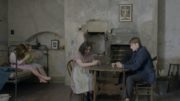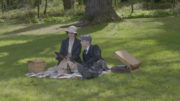Beyond The Bullets – Real Life During The War Years
Beyond The Bullets looks at the war years of 1921, 1922 and 1923 through a social history lens. Using a blend of text, archive, social data, reconstruction and contemporary music of the time we will paint a vivid picture of what real life was like in these historically significant years.
Each episode of ‘Beyond The Bullets: Real Life During The War Years’ will use text, original footage, photos, newspaper stories, movies, newsreel, contemporary music of the time and reconstruction to tell the story of that year. Allied to these devices will be deep social research that will present facts on areas like work and working conditions, sexual mores, education, class, leisure …
Over 6 episodes – two for each year – the narrative will play out in its original timeline (January to December) and will be crafted around the year’s key political events and incidents. This unfolding political narrative will provide our compelling ‘A story’ but it will be the integration of the other cultural, sporting, leisure and commercial elements that will make the films really engaging for a broad TV audience.
Beyond The Bullets is produced by Indiepics for RTE.
The series is supported by the Department of Tourism, Culture, Arts, Gaeltacht, Sport and Media under the Decade of Centenaries Programme 2012-2023.
Episode 5. 1923. January to June.
As the new year dawns the Civil War continues to rage with former comrades pitted against each other in an increasingly vicious struggle. Some New Year’s traditions remain unchanged as the Bray Harriers meet for the traditional hunt in Cabinteely, County Dublin. January sales draw bargain hunters for deals on everything from linoleum to furs.
The Revenue Commission is created to oversee the collection of taxes and customs duties.
15,632 marriages are registered in 1923. Irish couples marry at a later age than elsewhere. One adult in four never marries.
In the Rugby Five Nations Ireland once again finish last with just one win, by a single point at home to Wales.
British Archaeologist Howard Carter opens up the inner burial chamber of Egyptian Pharaoh Tutankhamen’s tomb.
On Saint Patrick’s Day, boxer Mike McTigue from Kilnamon fights Senegal’s “Battling Siki’ in Dublin’s La Scala Opera House. Republicans are targeting sporting and social events to highlight prisoner executions. The manager of La Scala receives a written threat from the IRA on the day of the fight and – as crowds queue to enter – a bomb blows the doors off the nearby Pillar Cinema. The fight goes ahead, with celebrities like George Bernard Shaw among the 15,000 strong crowd. After twenty bruising rounds – McTigue is declared World Light Heavyweight champion.
Professional and middle class couples have smaller families, indicating the use of restraint or birth control. The master of the Rotunda claims many middle-class patients are practicing family planning with contraceptives purchased and sent by post from Britain. He also bemoans the deprivation of poorer families unable to limit fertility.
The ‘Million Pound’ Grant introduced in 1921, is quickly running out, with little to show for it, but housing remains a problem ‘of appalling magnitude’ according to Finance Minister Ernest Blythe.
March is a particularly bloody period in the Civil war. Free State troops tie nine anti-Treaty prisoners to a land mine in Ballyseedy, Co Kerry. They detonate it, killing eight men instantly. One man survives.
Over the previous two years the GAA finals had been postponed. The All Ireland Hurling Final of 1921 is finally played. Limerick beat Dublin. In the 1922 hurling final Kilkenny beat Tipperary 4-2 to 2-6 in front of 40,000 spectators.
The Free State is close to bankruptcy. Cuts in public service wages and old age pensions are on the way.
In April, ‘Safety Last’ a romantic comedy film starring Harold Lloyd is a smash hit. Irish audiences thrill to the sight of Lloyd hanging from the arms of a giant clock in his most famous scene.
A Customs Frontier is established on the border.
In New York’s Rivoli Theatre, sound is heard on a film for the first time.
The Sisters of the Sacred Heart of Mercy open an institution at Bessborough near Cork.
O Casey’s ‘The Shadow of A Gunman’ opens in the Abbey Theatre.
On 30 May The new IRA chief of Staff Frank Aiken, calls a ceasefire …





